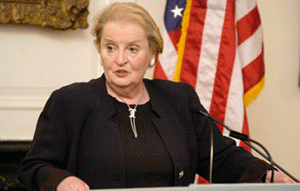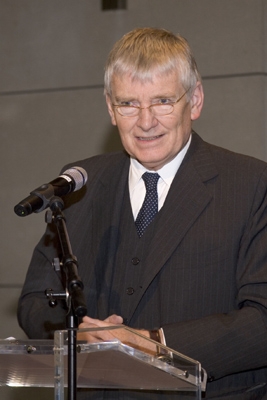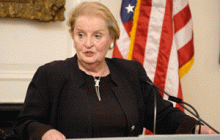
Former U.S. Secretary of State Madeline Albright

German Secretary of the Interior Otto Schily
The Burns social season has been in full swing with the annual awards dinner in Berlin on May 5 and the alumni dinner in New York on June 13. With impressive speakers and strong alumni attendance, both events were a great success.

Former U.S. Secretary of State Madeline Albright
Both speakers agreed that a unified U.S.-German front must support the democratic movements and newfound freedoms spanning from Kiev to Beirut and from Palestine to Iraq, in varying stages of infancy. In her speech to alumni, Albright said international exchanges like the Burns Fellowship are valuable in building and maintaining mutual understanding. The Burns program is unique in that it promotes understanding in young journalists from Germany and the United States. The Fellowship’s values are important at a time when bilateral relations have not been “quite as tranquil the past four years,” she said.
Albright addressed worries about the deteriorating relationship between Germany and the United States, which she characterized as a “natural partnership between two great democracies, and between two peoples with shared values and hopes.”

Former U.S. Secretary of State Madeline Albright
Working together for freedom beyond our borders
In addressing the political instability in the Middle East, Albright asked if Iraq’s election would transform the country into a “reasonably stable, moderately united, and more or less democratic” nation. She insisted Germany and Europe, as much as the United States and the vast majority of Iraqis, had a large stake in the progress of democratic movements in the Middle East. Albright warned that “we would be fooling ourselves if we believed that the elections were the climax to anything.” Instead she said they marked the beginning to a new and uncertain phase. “Freedom in Iraq may be on the march, but it also remains under fire. And it has many more miles to go before ‘mission accomplished,’ becomes a reality,” she said.
Neither the United States nor Europe can impose peace in the Middle East, Albright said, but both can work to strengthen the forces of moderation and reason, provide incentives to reward progress, and work with friends in the Arab world to create a climate for a diplomatic solution.
At the Berlin dinner, Schily reiterated Albright’s premise that common vital security interests on both sides of the Atlantic will cement a lasting strategic partnership between Germany and the United States. “Because of this,” Schily said, “we have German and American troops in Afghanistan. Together we try to prevent Iran from becoming a nuclear military force. Together we try to advance the peace process in the Middle East. “Freedom and democracy have many enemies, and often cannot survive on their own. They must be gained and defended. Those who no longer want to fight for the freedom of others, who do not want to export democracy, they will make themselves and their own values implausible,” Schily said. Although the European Union is not a homogenous entity, Schily said it is still a “union of freedom-exporting nations,” and as such it also should work in union with the United States. “Because the transatlantic relationship is a partnership of freedom, and at the same time for freedom, this is the fundamental core of our shared values. It is the moral foundation of our strategic partnership,” he said.
For Schily, Europeans and Germans should realign their notion of freedom with the Americans. “The endeavor for equality, as important as this may be, must not squash freedom.”
Recent French and Dutch votes on the European constitution shouldn’t be interpreted as a doomsday scenario for the European Union or an end its unification efforts, Schily said. A departure from the current path would not be desirable, especially in regards to common national security and economic issues among E.U. member states.
What’s missing in Europe, according to Schily, is “more self-confidence, audacity, courage, responsibility, reliance on its own abilities and initiative, and a little more American pragmatism and optimism.”
The Burns Fellowship program is grateful to Goldman, Sachs & Co. and Deutsche Bank for sponsoring these annual alumni events.